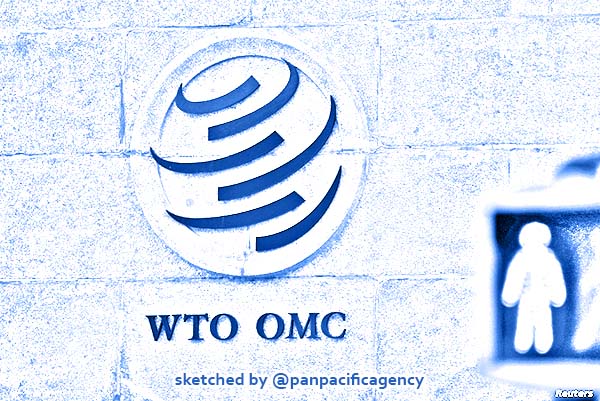Japan temporarily blocks South Korean WTO dispute request

A logo is pictured outside the World Trade Organization headquarters, near a stop sign, in Geneva, Switzerland. Sketched by the Pan Pacific Agency.
TOKYO, Jun 30, 2020, Bloomberg. The Japanese government blocked South Korea’s initial request for a World Trade Organization dispute inquiry into Tokyo’s export-license restrictions on electronics components, The Japan Times reported.
During a meeting in Geneva on Monday, the Japanese delegation said its restrictions on three classes of chemicals used in the production of semiconductors and digital displays are permitted by WTO rules and explicitly tied its defense to the trade body’s national security exemption.
WTO rules prevent Japan from blocking a dispute inquiry if South Korea returns with a second request at the next WTO dispute-settlement meeting. The next such meeting is scheduled for July 29, but the WTO could hold a special session before then if South Korea lodges a second request.
South Korea’s delegate to the WTO said Japan’s measures represented a “WTO inconsistent restriction on exportation” that has caused “unnecessary delays, uncertainties, costs and other serious restrictions” on South Korean manufacturers like Samsung Electronics Co. and SK Hynix Inc., according to a statement obtained by Bloomberg.
Japan countered that its measures were not an export ban, as Seoul claimed, and were aimed at preventing Japanese goods from being diverted to weapons or military use, according to another statement obtained by Bloomberg.
“Japan is seriously concerned that Korea is challenging fundamental premises underlying the internationally established frameworks and efforts for non-proliferation of arms and sensitive military technologies including Weapons of Mass Destructions,” the Japanese statement said. “This poses the serious risks of destabilizing international peace and security.”
Trade relations between Tokyo and Seoul have soured since South Korea’s top court ordered two of Japan’s largest companies — Mitsubishi Heavy Industries Ltd. and Nippon Steel — to compensate the families of South Koreans who were forced into labor during World War II.
The Japanese government said the move was illegal and unsuccessfully called on Seoul to resolve the matter according to a 1965 treaty that normalized relations and included compensation payment.
After the South Korean government rebuffed Japan’s overture, Japan announced its export restrictions and proposed to remove South Korea from its list of nations that are exempt from national-security export controls.
Japan’s national security claim may thrust the Geneva-based trade body into yet another politically charged clash upon the WTO’s already hobbled dispute settlement system.
Though the WTO has sought to steer clear of national security matters, such disagreements have proliferated since the Trump administration imposed national security tariffs on its trade partners’ steel and aluminum exports.